Adil Najam
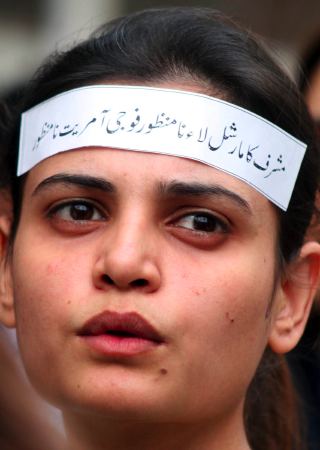 I have been traveling nearly non-stop over the last month, and events in Pakistan are headline news everywhere. More than that everyone is asking questions about Pakistan. An immigration official in Baku, Azerbaijan, asked me (2 weeks before the emergency) how long Musharraf will survive? A hotel receptionist in Musqat, Oman, asked more politely if “all is well in your country?” (one week before the emergency). In Pakistan (just days before the emergency) the question was more like “What is America planning for Pakistan?” A shop-keeper in Trondheim, Norway, asked (one day before the emergency) wondered if “Benazir will solve Pakistan’s problems?” And my driver in Cairo, Egypt, asked yesterday “Has Musharraf gone mad?”
I have been traveling nearly non-stop over the last month, and events in Pakistan are headline news everywhere. More than that everyone is asking questions about Pakistan. An immigration official in Baku, Azerbaijan, asked me (2 weeks before the emergency) how long Musharraf will survive? A hotel receptionist in Musqat, Oman, asked more politely if “all is well in your country?” (one week before the emergency). In Pakistan (just days before the emergency) the question was more like “What is America planning for Pakistan?” A shop-keeper in Trondheim, Norway, asked (one day before the emergency) wondered if “Benazir will solve Pakistan’s problems?” And my driver in Cairo, Egypt, asked yesterday “Has Musharraf gone mad?”
You have to be impressed by how much ordinary people around the world know about Pakistan. But also sad that this is what they are thinking when they think Pakistan.
I do not think I have been able to respond to any of them satisfactorily. Politics in Pakistan is way too complex, even for us Pakistanis.
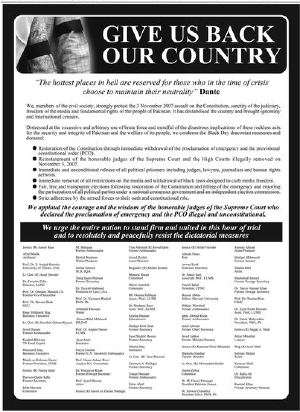 But to each I have said, in different ways, that the real story in Pakistan is not about Gen. Pervez Musharraf. The real story is about Pakistanis demanding democracy. The reason the general has had to use ever increasing pressure and more draconian measures is precisely because the people who want democracy are just not giving up. As we have said before, here is a democratic society trapped in an undemocratic state. This is a moment to be proud of Pakistanis. The failure here is not of Pakistan. It is of Gen. Pervez Musharraf (and he wrote his own indictment in his ’emergency’ speech).
But to each I have said, in different ways, that the real story in Pakistan is not about Gen. Pervez Musharraf. The real story is about Pakistanis demanding democracy. The reason the general has had to use ever increasing pressure and more draconian measures is precisely because the people who want democracy are just not giving up. As we have said before, here is a democratic society trapped in an undemocratic state. This is a moment to be proud of Pakistanis. The failure here is not of Pakistan. It is of Gen. Pervez Musharraf (and he wrote his own indictment in his ’emergency’ speech).
And this is what is most heartening. In response to a journalists question yesterday, I elaborated on something I have been saying already (here, here and here):
…this is a moment of great pride for Pakistanis. How can you not be proud of your people when ordinary citizens – lawyers, journalists, students – come out on he streets ready to be beaten up and put in jail… knowing that they will be crushed and yet demanding democracy…. this is NOT Pakistan’s failure… this is a moment of success for Pakistan’s people… the reason that the military government has been forced to apply ever greater force and every more draconian measures is simply because the democracy forces in the country (the lawyers, the students and journalists… unfortunately not the politicians as much) are simply unwilling to bow down. In the past people used to stop demanding democracy at much less pressure than this. Now they are resisting pressure and they keep demanding democracy and freedom.
Even as I travel (still on the road) and check email on unreliable connections and unfamiliar computers, I find my inbox and the comments on ATP innundated with information about what ordinary citizens are doing. This is most heartening.
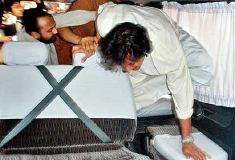
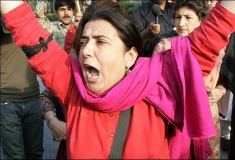

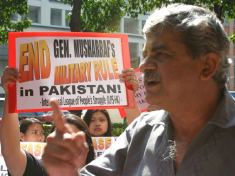
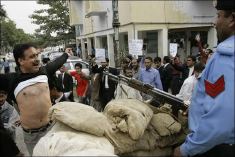
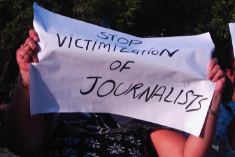
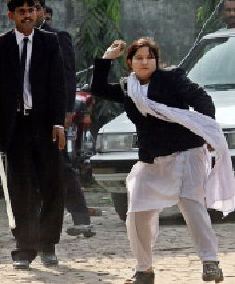
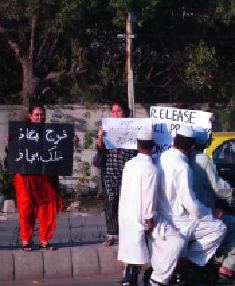


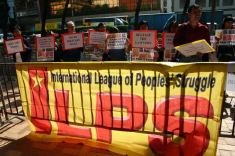
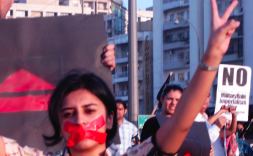
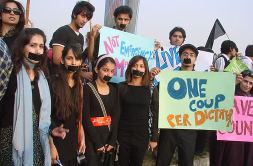
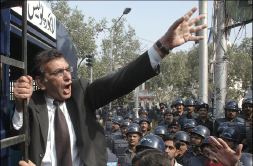
The pictures say it all and I will let the pictures do the talking here. But as I look at teh pictures, some points do pop into the head about who is protesting here and who is not. Maybe our readers can comment more on this:
- Note carefully who is protesting for freedom, human dignity and democracy. These are ordinary people. Lawyers. Students. Journalists.
- Note carefully who they represent. These are amongst the most so-called ‘secular’ and ‘liberal’ classes in society. The people who were supposed to be Gen. Musharraf natural constituency. Musharraf has lost the support of the very people who were supposed to be (but never really were) most aligned to him. [Readers, please spare us your diatribes and fatwas about what ‘secular’ and ‘liberal’ means. Despite the propaganda from some, neither of those terms means anti-religious or un-Islamic… There is a huge literature on this, so please read it. But, for Allah’s sake, not on Wikipedia!!].
- Note also the solidarity being shown by Pakistanis within and outside Pakistan. While there are obviously those who do support the general, the opposition to the emergency is more widespread than anything one can remember. One can scarcely think of any political act that has united our otherwise divided society they way the general opposition to the Emergency has.
- More importantly, please note who is NOT in the pictures. Who is not on the streets protesting.
- Political activists and political leaders are not on the streets. They make statements, but half-heartedly. This is not a movement led by politicians. In fact, it is not even clear whether the politicians are smart enough to just follow the people on the streets. Really conspicuous by their absence are the ‘political workers’. The Million who greeted Benazir, or were supposedly stopped from greeting Nawaz Sharif, or routinely come out for the MMA, are nowhere to be seen. Their leaders have failed to mobilize them, or maybe not tried to do so at all.
- The one exception to the above may be Imran Khan, but I have long felt that at his core he is more of a civil society actor than a political leader in the true sense; his stance, his style, and even his vote bank seems to suggest the same.
- Also conspicuous by their absence are the religious parties, the MMA. Beyond statements they do not have much to contribute here. Their words and boasts onpeople’s will and democracy are large but their actions no different from the secular parties.
- Finally, and probably most importantly, missing from the streets and from protests are the religious extremists (not to be confused with the religious parties which are religious but, mostly, not extremists). The folks who were killing and terrorizing and blowing up ordinary Pakistanis in Swat, in Islamabad, and elsewhere seem not too worried about the Emergency and not to unhappy at the death of democracy. They may even like it that way. This is important because supposedly the Emergency was imposed to curtail them and their activities. However, they seem to be neither affected not interested in the Emergency or the opposition to it.
While the shape of things will obviously evolve, it does seem that a new politics is taking shape in Pakistan. A people-centered politics that might just sideline the mainstream political parties as well as the extremists. It is way too early to say that this will happen. It is quite probable that it will not. But one can certainly not be faulted for hoping that it just might.


















































Found at Lums Blog
http://lumsblog.com/
Student expulsion on wearing black ribbons
”A piece of paper titled FLASH, literally threatening students involved in demonstrations and political activities was pasted to walls and passed through the corridors of Bahria University. It stated that those involved would be subject to strict disciplinary actions including but not limited to expulsion, cancellation of degrees as well as legal action. These
I believe the most important thing some of us are forgetting while praising Mush and his buddies is the millions of dollars of U.S. aid that Mush has received after 9/11. So, we can’t give the entire credit for the development in Pakistan in the previous 6-7 years to Mush, as he had pretty much in his pocket to go with.
Also, Mush should be condemned for having his security agencies capture and torture scores of innocent people on grounds of being involved in terrorists activities. Numerous among them are still rotting in some far-flung prisons that none among us has even heard of.
“So, therefore”, its fairly unfair to give all the credit to Mr. Mush. He’s got plenty of blots on his conscience that he needs to wipe off.
I have been very impressed that most of the protests have been peaceful despite the use of violence by the government. This shows a mature civil society which is a must for a democratic society.
The subject of Democracy in Pakistan is based on hypothetical assumptions that:
(1) The Pakistani Society is a Democratic Society.
(2) The Lawyers, Journalists and Students are Ordinary Pakistani citizens.
(3) The Secular and Liberal element of the society is necessary for a democratic regime.
The Democracy is the system of government where the People is sovereign to decide for itself in State affair. The people
The News, Nov 18, 2007
RIPPLE EFFECT
Regulating (read stifling) the media
By Omar R. Quraishi
As I got down to writing this week’s column I came across this news item in APP — the government-run news agency. Titled ‘Azeem hopes progress on media issues in next few days,’ the report quoted minister of state for information, Tariq Azeem, as telling a private TV channel (one of those which remains off air) that “issues relating to the media would be worked out in the next few days.” The minister was further quoted as saying that the government “firmly believes in press freedom” and that it had “no intention to dictate to the media.”
One wonders which government the honourable minister is talking about because if he is referring to the Musharraf government then that has shown by its actions since Nov 3 that it is no friend of an independent and free media.
The TV channels were ordered off air in a manner that cannot, by any stretch of the imagination, be thought of as being fair or even legal. No notice was given by PEMRA to the channels for the offences or violations committed and it was only after several days of the blackout that one heard of a so-called ‘voluntary code of conduct’ that the government was now saying the channels would have to sign for their transmissions to be restored. A lot of what is contained in the code of conduct is already found in the existing PEMRA rules and regulations.
However, certain new clauses added seemed to only add to the already-vast discretion that the electronic media regulator has. For instance, clause (g) says that “anything against socio-cultural norms” will not be aired. Clearly, this is such a wide and vague ‘definition’ that it leaves broadcasters vulnerable to abuse and intimidation from a government that is bent on a hostile confrontation with the media.
There is no official definition of what constitutes ‘socio-cultural norms’ but it is likely that the arbiter in such a situation will be the government, PEMRA to be precise, and it will dictate to the broadcaster what the norms are and take it to task for violating them. In addition to this, another clause, (o), seem to target certain individuals whom the government feels are doing shows that are sharply critical of its policies.
According to the clause, all broadcasters that sign the code of conduct will be prohibited from carrying any content or programming, “including talk shows based on personal bias.” Since when is a talk show not based on one’s personal bias — the whole idea of having a talk show is to invite people with differing points of view and have them talk to each and debate and discuss issues. It may be partly true that many of our talk shows do not really add to a person’s knowledge or information about certain events and that many often invite the same people over and over again but to ban those based on ‘personal bias’ is tantamount to censorship. The reason why people with differing points of view — the talks shows often have government spokespersons in the form of ministers and opposition politicians and sometimes independent experts/scholars or journalists — are invited is so that they argue and debate the issue at hand. This can only happen if the person engaged in the argument has a stand or a position regarding something and that means a bias. When three or four people engage themselves in discussion, each with his/her own standpoint and bias, then chances are that the talk show will be engaging.
Since codes of conduct seem to be in fashion now, it may be instructive to look at how the press and media in Britain go about their business. There is Ofcom, an independent regulator for (according to Wikipedia) the communications industries in the UK. Part of its duties as the electronic media’s regulator is to examine complaints from the public. According to its website, a complaint is entertained after being received by a viewer or listener after which Ofcom asks the broadcaster for a copy of the programme.
In the case of the TV channels’ blackout on Nov. 3, clearly there was no prior warning or notice to the broadcasters. In fact, it would be fair to say that the channels were taken off air not for airing anything that was objectionable or illegal but rather for what the government thought they would air — which in any case would be news of the imposition of the emergency.
Back to Ofcom. After seeking the copy of the programme that was broadcast, it asks the broadcaster to respond to the complaint. It is this response which is then examined by the regulator and the complaint is either denied or upheld. A third option is that the complaint is ‘resolved’, pointing to an amicable settlement.
And now to PEMRA. What does it do? It acts first and asks questions later (if at all). First the channels are taken off air, through the cable operators’ route and then when everyone begins to wonder what in the world happened and why this action, only reluctantly is any reason given.
Both Aaj TV and Radio 103 complained that following November 3, raids were carried out at their offices and equipment was seized. No notice or prior warning of any kind was given. In one case, staff said that those carrying out the raid said that they could either take the equipment in a nice and peaceful way and if they weren’t allowed to do that then there were ‘other’ ways.
Those channels who do sign the ‘voluntary’ code of conduct should remember that once they do that, they would well sign their independence and credibility away. Of course, one view is that when this dispensation is no more, the code of conduct will also die its natural death. However, if one looks at Zia’s days, government restrictions, especially on the media are often hard to take away and stick around for far longer than any professional journalist worth his or her salt would like. The reason for that is simple: any government would always like to have a lever with which it can keep the media in check. Also, independent broadcasters would do well to realise that part of the reason why they are far more popular than, say, PTV, is because of their very independence and credibility and hence the fact that many people watch them.
The writer is Op-ed Pages Editor of The News.
Email: omarq@cyber.net.pk